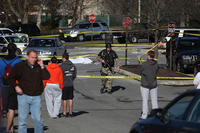-
Georgia readies portable hospitals
On Monday local health and emergency response officials from Georgia’s West Central Health District gathered to learn how to quickly set up a portable hospital in the event of an emergency
-
-
The Israeli military prepares for a new type of war
The Israel Defense Force (IDF) has created a new military command – the Strategic Depth Command; this new command, and the new, commando-heavy, look of the IDF’s higher echelon, should tell us that Israel is preparing for a new type of war; adversaries of Israel who have been entertaining the thought that sheer distance from Israel would offer them some protection, may want to think again
-
-
DHS helps New Mexico battle local gangs and cartels

In recent years, DHS has sent more and more federal agents and resources to New Mexico to help local law enforcement officials battle gangs, catch drug dealers, and other criminals; since 2009 DHS has deployed more than sixty agents to New Mexico and formed several joint task forces and multiagency groups
-
-
Rapid DNA test system nears completion
Thanks to an additional $40 million in funding, IntegenX is close to creating a real-time DNA analysis system; the company is currently working to complete a rapid DNA test kit that can provide law enforcement officials, government agencies, or forensic laboratories with real-time biometric identification
-
-
Jail installs facial recognition tool to prevent accidental releases
To prevent the accidental release of the wrong inmate, Madison County Jail in Alabama recently became the first prison in the United States to install 3D facial recognition technology
-
-
Measuring the effect of fire on materials
Researchers at Universidad Carlos III de Madrid (UC3M) are developing an infrared measuring method to analyze the thermal properties and resistance to fire of composite materials; this advance would have applications in areas where fire safety requires that the composite materials withstand high temperatures
-
-
Atlanta debuts new emergency communications systems
Last week first responders in Atlanta, Georgia gained a valuable new tool in helping to reduce 911 response times and improve communication during a disaster
-
-
The border fear index: How to measure border security
Both the administration and its critics rely on the FBI Uniform Crime Reports and on reported by the national media to make their arguments about how secure the U.S.-Mexican border is, and how to make it more secure; Lee Maril contends that the FBI report and the national media do not offer an accurate picture of the situation along the border because they are not nuanced enough; for example, they ignore the fear instilled in border-area residents by the cartels and the cartels’ collaborators, and they do not collect other relevant human behavior data
-
-
DHS helps diffuse Verizon emergency alert scare

Thanks to social media, DHS was able to help quickly diffuse an alarming situation for residents in New Jersey
-
-
New technology helps Virginia Tech avoid another massacre

Last week Virginia Tech officials made all the right decisions after a man killed a campus police officer, showcasing the valuable lessons it had learned following the 2007 Virginia Tech massacre that left thirty-two people dead and twenty-five injured
-
-
Technology helps Jersey police fight crime in real-time
In the last decade massive technological breakthroughs have made information more accessible than ever before and law enforcement agencies are increasingly taking advantage of new mobile technology to help fight crime
-
-
Key to disaster preparedness is “training, training, training”

Bonnie S. Michelman, CPP/CHPA, the director of police, security, and outside services at Massachusetts General Hospital, recently took the time to speak with Homeland Security NewsWire’s executive editor Eugene K. Chow; in their interview, Michelman highlights the recent technological security measures Massachusetts General has installed, finding the right balance between security and openness, and preventing terrorists from stealing the low-grade radioactive materials that are housed in hospitals
-
-
Water rescues prove dangerous for first responders
Water rescues are particularly dangerous for first responders, and the recent attempt to rescue a man who jumped from a bridge over the Oswego River in New York last month proved to be no exception
-
-
Terrorists using sophisticated uni-directional bombs
Terrorists have learned to develop increasingly sophisticated explosives as evidenced by the uni-directional bombs detonated last week in Karachi, Pakistan that killed three Pakistan Rangers and injured several others
-
-
FBI opens new forensics lab for local law agencies in New Mexico
Thanks to a sophisticated new FBI forensics laboratory at the University of New Mexico in Albuquerque, local police now have access to cutting edge technology that can help streamline investigations
-
More headlines
The long view
Why Ukraine’s AI Drones Aren’t a Breakthrough Yet
Machine vision, a form of AI, allows drones to identify and strike targets autonomously. The drones can’t be jammed, and they don’t need continuous monitoring by operators. Despite early hopes, the technology has not yet become a game-changing feature of Ukraine’s battlefield drones. But its time will come.
